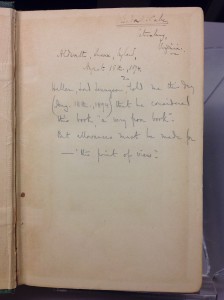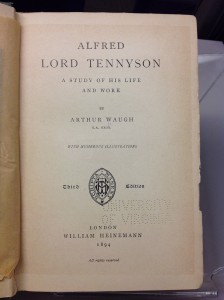“Grant Boosts Efforts to Catalog Secrets Hidden in Old Library Books,” an article published in U.Va. Today, provides a nice introduction to the project–formerly called Hidden in Plain Sight–that has turned into Book Traces @ U.Va.
Associate Professor of English Andrew Stauffer began a crowd-sourced project, “Book Traces,” earlier this year to preserve this hidden literary life of the 19th century before many older volumes get moved off of library shelves. He considers the project an “intervention” to retrieve these fragile copies that reveal aspects of social life, the history of reading and uses of the book.
Now Stauffer has teamed with Kara McClurken, head of the University Library’s preservation services, to expand the recovery effort. The Council on Library and Information Resources recently awarded them a two-year, $221,000 grant for their project, “Hidden in Plain Sight,” to discover, describe and preserve unique pre-1923 books in the circulating collection.
After the 1895 Rotunda fire destroyed U.Va.’s library, many people donated their own books to rebuild the collection, McClurken said.
Like many readers, “I used to think that things written in books were nothing but a defacement,” she said.
Then McClurken met Stauffer this summer in a Rare Book School class in the library. Through their conversations, she began to understand there were important things to be learned from the marginalia and artifacts found on the pages. The historical evidence “has a role to play” in scholarly research, she said.
With the grant, library staff members will seek to identify subject areas that are most likely to have marginalia. They’ll work on a process to record the information and enter it into the online catalogue; at U.Va., that’s Virgo. Because many of the volumes are fragile, they’ll figure out how best to preserve them. Another goal is to make sure other academic libraries can use the process.
Read the full article on the U.Va. Today website.



